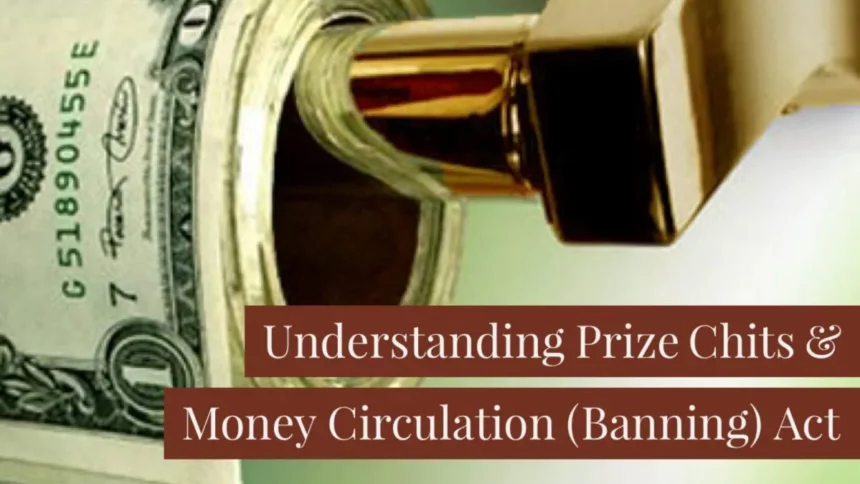Each time a newspaper report appears referring to fraudulent activities of alleged ‘pyramid companies’ it is sure to mention that these activities were in violation of the Prize Chits and Money Circulation (Banning) Act, 1978 (hereafter referred to as the PCMC Act). The PCMC Act is often mentioned in reference to legal challenges faced by QNET in India, as with several other leading direct selling companies.
So what is the PCMC Act and why are QNET and other legitimate direct selling companies up in arms against its application to our industry?
Let’s start by understanding what is a Chit Fund.
Chit Fund
Section 2(a) of the PCMC Act defines ‘conventional chit’ in the following:
“conventional chit” means a transaction whether called chit, chit fund, kuri or by any other name by or under which a person responsible for the conduct of the chit enters into an agreement with a specified number of persons that every one of them shall subscribe a certain sum of money (or certain quantity of grain instead) by way of periodical instalments for a definite period and that each such subscriber shall, in his turn, as determined by lot or by auction or by tender or in such other manner as may be provided for in the chit agreement, be entitled to a prize amount.
Explanation
In this clause “prize amount” shall mean the amount, by whatever name called, arrived at by deducting from out of the total amount paid or payable at each instalment by all the subscribers, (i) the commission charged as service charges as a promoter or a foreman or an agent; and (ii) any sum which a subscriber agrees to forego, from out of the total subscriptions of each instalment, in consideration of the balance being paid to him;
A Chit fund, i.e., the conventional chit is a kind of savings scheme practiced in India that was very popular in the 1970s. Typically, a Chit Fund Company is a company that manages, conducts or supervises a chit scheme. A Chit Fund Company has to gather a specified number of people who are interested in investing in this ‘chit group’. These persons are called Subscribers.
Once the chit group commences, the foreman has to register the chit with the registrar of chits. He has to pay 100% of the chit value as security. This amount can be withdrawn only after the said chit group closes and every subscriber is paid what is due to him or her. This regulation protects the interests of the subscriber to a certain extent.
In simple terms, a chit fund is a savings-cum-borrowings scheme, wherein a few people (known as members or subscribers) come together and invest a fixed amount every month for a fixed period.
To best explain its working, here’s a simple example:
Let’s assume there is a chit fund
- with 10 members
- each contributing Rs. 3,000 per month
- for 10 months
Thus, total monthly collection in this chit fund is Rs. 30,000.
Suppose in the 1st month, 2 members need funds and participate in the bidding.
- Member 1 bids for Rs. 27,000
- Member 2 bids for Rs. 26,000
Thus, Member 2 becomes eligible to draw the money for the month as his bid is lower than the first member’s bid.
While the conventional chit is not prohibited under the PCMC Act, what are banned under the PCMC Act is the ‘Prize Chit’ and ‘Money Circulation Schemes’; as defined under the said Act. Prior to understanding the basis for such banning, it is necessary to understand the background to the PCMC Act.
History of PCMC Act
In June 1974 the Reserve Bank of India constituted a Study Group under the Chairmanship of James S. Raj, the then Chairman of Unit Trust of India, for examining in depth the provisions of Chapter III-B of the Reserve Bank of India Act, 1934, and the directions issued thereunder to non-banking companies to assess their adequacy in the context of ensuring the efficacy of the monetary and credit policies of the country and affording a degree of protection to the interests of the depositors who place their savings with such Chit Fund companies.
In its report submitted to the RBI in July 1975, the group principally observed that the prize chit/benefit/savings schemes benefit primarily the promoters and do not serve any social purpose. The Group has stated that, on the contrary, they are prejudicial to the public interest and affect the efficacy of the fiscal and monetary policies of the country. It was in this background that the PCMC Act was brought in force.
Present Context
The biggest challenge the Indian direct selling industry faces today is that of regulatory uncertainty and lack of legislative support in expressly recognizing the industry as falling outside the prohibitions of the PCMC Act. The industry is adversely affected by the lack of a proper legal framework, which compromises the growth of the industry in India. There is no systematic and standard policy for direct selling that is based on the constitutional structure.
The following is an attempt to cull out the distinction between prohibited money circulation schemes and multi-level and network marketing as practiced by Direct Selling Companies.
Section 2(c) the PCMC Act defines “money circulation schemes” as:
“… any scheme, by whatever name called, for the making of quick or easy money, or for the receipt of any money or valuable thing as the consideration for a promise to pay money, on any event or contingency relative or applicable to the enrolment of members into the scheme, whether or not such money or thing is derived from the entrance money of the members of such scheme or periodical subscriptions”
Consider the differences as laid out in this graphic.
The clause “on any event or contingency relative or applicable to the enrolment of members etc” does not adequately provide for the special case relating to multi-level marketing models used by direct selling companies.
The bone of contention is that the PCMC Act empowers States to formulate their own rules to implement the law. Although nothing in this Act refers explicitly to direct selling businesses, in certain States, unfortunately, legitimate direct selling activities have been alleged to be akin to money circulation schemes and thus, covered under the PCMC Act. The regulators have alleged that some of the companies engaged in direct selling conduct ‘money laundering activities’ by promoting or conducting a scheme for making of quick and easy money.
This regulatory challenge has lead to business uncertainty in India, with an added risk of harassment and business disruption. As experienced by QNET, authorities have booked various direct selling companies for alleged unlawful activities under the PCMC Act. Given that the Act was implemented in India much before the advent of direct selling in India (most direct selling companies started operations in India only in the 90s) and has an archaic understanding of issues, it is unable to distinguish rightful direct selling businesses from malicious money circulation schemes.
Currently, under the PCMC Act customer complaints are acted upon as criminal offense and gives investigating officers the power to arrest and seize company assets along with arrest of many key individuals that get widely reported in the media. This not only creates a negative perception of the industry, and unnecessary fear in the minds of potential customers, it also hampers the growth of a business that has been thriving for more than 60 years around the world and has benefited millions of people.
It is in this backdrop that the need to confer regulatory clarity and certainty to direct selling companies with legitimate businesses arises. QNET and many other leading direct selling companies have been legitimately lobbying hard for an amendment of the PCMC Act, citing the possibility of misuse.
To provide a conducive and sustainable operating environment in India for the companies operating in Direct Selling industry, a series of reforms are required ranging from immediate short-term reforms in the nature of certain amendments in the PCMC Act to clearly distinguish between pyramid scheme, money circulation scheme and multi-level marketing, to long-term measures of enacting a specific governing legislation for the sector. Given the huge employment proposition that direct selling companies bring about, it would be in the best interest of all the stakeholders that States expeditiously revisit the fundamental understanding of the prohibition under the PCMC Act.
A separate policy framework for the direct selling industry can clear the blurred lines between ethical industry players and fraudulent companies and go a long way in regaining consumer confidence. This change is imperative and will enable legitimate businesses to conduct their business smoothly and contribute to the economic development of the country.
References:









Very good info..Gives the clearity!!
It gives us clear detail information about rules and regulations. It is indeed very important & useful information one should know in detail.